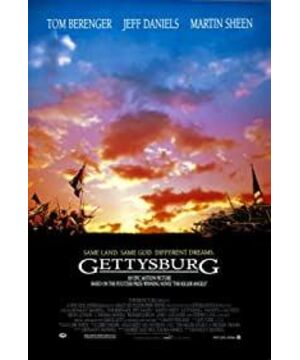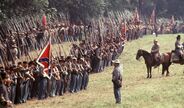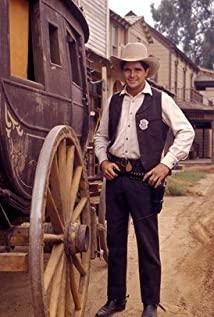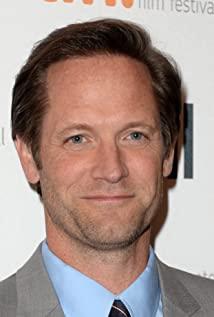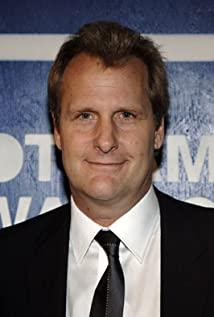Gettysburg movie plot
-
Rowan 2022-03-20 09:02:26
7 points. The most important decisive battle in the American Civil War, it can be regarded as a big production in the 1990s. As an epic film, it is naturally qualified, but more than 4 hours is too long. Moreover, in the wild age of computer CG, it was difficult to represent so many soldiers. In addition, the battle itself is depicted in a straightforward manner, lacking in bright spots. Overall it's just average.
-
Annetta 2022-03-27 09:01:15
The military-blind and history-blind said that they could not read.
-
Lieutenant General James Longstreet: [Longstreet and his staff have ridden too far forward immediately following Pickett's Charge; a cannon blast almost kills Goree] God!
[Goree slowly gets up]
Lieutenant General James Longstreet: How are you, T.J.?
Cap. Thomas J. Goree: I'm tolerable, sir.
Lieutenant General James Longstreet: [looks across the battlefield to Cemetery Ridge and sighs] They ain't comin'. Too bad.
Cap. Thomas J. Goree: [Goree looks in the same direction] Yes, sir. General... I'll tell you plain. There are times when you worry me.
Lieutenant General James Longstreet: Well...
Cap. Thomas J. Goree: No good tryin' to get yourself killed, General. The Lord'll come for you in His own good time.
Maj. G. Moxley Sorrel: What are your orders, sir?
Lieutenant General James Longstreet: [sighs] Prepare for a defense, but... the Yankees ain't comin'. Come on, boys.
[he sadly rides away]
-
Brigadier General Lewis A. Armistead: The last time I saw Winn he played that song. That very song. Back in California, we were all together for the last time. Before we broke up. Spring of '61. Almyra Hancock. You remember Almyra, Hancock's wife? Beautiful woman. Most perfect woman I ever saw. They were a beautiful couple. Beautiful. Garnett was with me that night. A lot of fellows from the old outfit. People standing around singing in the blue uniform. We were leaving the next day. Some going north, some going south. Splitting up. A soldier's farewell. "Goodbye." "Good luck." "I'll see you in hell." Do you remember that? Towards the end of the evening, we all sat around the piano. And Myra played that song there, that was the one she played. Maybe for years, maybe forever, I'll never forget that. You know how it was, Pete. Winn was like a brother to me. Remember? Towards the end of the evening, things got a little rough. We both began to... well, there were a lot of tears. I went over to Hancock. I took him by the shoulder. I said, "Winn, so help me, if I ever raise my hand against you, may God strike me dead." Ain't seen him since. He was at Malverne Hill, White Oak Swamp, Sharpsburg, Fredericksburg. One of these days, I will see him, I'm afraid. Across that small, deadly space. I thought about sitting this one out. But I can't do that. That wouldn't be right either. I guess not. Thank you, Peter. I had to talk about that.


